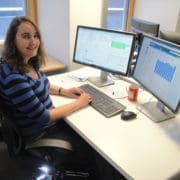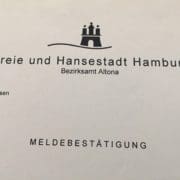Brigitte from the Netherlands „It makes me happy to live among people who are so welcoming towards foreigners“
Hi Brigitte! Thanks for taking the time to answer our questions. Can you introduce yourself in a few words to start off?
I am Brigitte (28), I come from the Netherlands and have lived in Hamburg since October 2015. I have degrees in History and Middle Eastern Studies and lived in Scotland, Tunisia, Turkey, Kuwait and Egypt during my studies. I ended up in Hamburg completely by chance. As many of my university friends were struggling to find jobs, I decided to be flexible about the job location.
Having lived abroad before, it was a relatively easy decision to look across the border for opportunities too. I had set my mind on a move back to the Gulf when my flat mate at the time suggested I should look into possibilities of moving to Germany, as according to her the job market here was so much better than back home. So among a few dozen applications for jobs in the Netherlands and the Gulf I sent two applications to Hamburg and Berlin.
To my surprise I was offered two jobs at the same time, one in Kuwait and one in Hamburg. Kuwait is by far the most fascinating country I have ever lived in, so Hamburg or Kuwait was a choice between the heart and the head really. I ended up choosing the head, because of the career options. Never regretted it. It is very unlikely that I would have gotten my current job back home, as any vacancy leads to hundreds of applications, most of those from people more qualified to do the job because they have degrees related to that particular field.
A historian ending up in market research in the Netherlands? A very small chance indeed!
What’s your role at Statista and how did you end up working there?
I work as a researcher for the Benelux market. The Benelux project was started in February last year, and I joined the team in March. Near the end of my temporary contract at bab.la, I happened to come across the vacancy in one of the expats in Hamburg groups on Facebook. I exchanged a few messages with the girl who posted it, decided I liked what she said about the company, and thought it would be worth the shot as I matched all of the criteria.
I did not give much for my chances, as I had never had anything to do with statistics anymore after high school, but figured since she was a literature major, they might as well take on historians. And it turned out they were happy to, and another historian has since joined.

Source: Brigitte Van de Pas
My daily work consists of research on consumer goods, retail/trade and society in the Benelux countries, that is, Belgium, the Netherlands and Luxembourg. I gather market data from different sources, translate it to English and turn it into nice looking statistics that our customers can access via our Statista platform.
Next to that I also work on customer requests, when clients are in need of more specific data that is not yet available on the platform. I am also responsible for the production of weekly infographics about current topics aimed at the Netherlands market.
How does the office culture differ from your homeland, or where you worked before?
It is hard to say anything about this, as the places I worked before were all so very different: I did internships at the embassy in Kuwait and a human rights organization in Egypt, started my career at Wikipedia and worked at bab.la before joining Statista.
All these companies are different in nature: the embassy was formal and conservative, at the human rights organization I was one of only two foreigners in an Arabic environment, and bab.la and Wikimedia Nederland were both very small organizations. This is the first time I am working in a company employing more than 15 people, and that alone makes a huge difference.
Contrary to stereotypes, I find the companies I have worked for here in Germany less hierarchical than expected. I am on first-name terms with my bosses, and they are very approachable and open to suggestions. Things were quite different in Kuwait and Egypt, but to some extent this was also a result of working in a completely different organization: one does simply not call an ambassador by his first name.
But when everyone else calls your boss ‘Mr. Ambassador’ or ‘Your Excellency’, a simple ‘Mr. + surname’ and ‘Sir’ is already quite informal. And of course it makes all the difference that I am a bit older myself as well now. I was very easily intimidated by my first boss, and he was an ambassador too at that! And in Egypt I hardly ever saw or spoke to my boss, and communication usually only went via a secretary. That is normal if your organization has 400 employees, a bit more surprising when the company has less than 20 people.
Generally speaking, I think German companies take care of their employees extremely well. My previous boss had huge amounts of fruit delivered every Monday, and paid a weekly company lunch. Statista offers not only fruit, but also candy, free soft drinks and beer (after working hours, of course!). I have worked previously in the Netherlands, Kuwait and Egypt, but have never been offered anything other than water, coffee and tea. Hard work is rewarded with extra days off when targets are met. A great incentive of course, as pretty much our entire international team loves to travel.
What will never cease to amaze me here is office communication. In the Netherlands we are used to either walking to a desk, or pick up a phone when we want to talk to someone. On your very first day here you are asked to install Skype, Slack or whatever other internal communication program the company uses. On my first day at bab.la the silence almost drove me crazy, hours would pass without anyone saying a word.
My colleague across the table would send me a Skype message if she wanted to explain me something, asking me to come to the other side of the table via the computer. It was only later I discovered that conversations had shifted online. After that it was never really silent anymore in the office!
Does compiling statistics all day long change your vision of the world we live in?
Oh absolutely! I am a trained historian, and data that is 10 years old was once very recent to me. These days I only consider reports from 2015 or later as relevant and interesting enough, as things can change so rapidly. University taught me to do qualitative research, but Statista has made me a better researcher by forcing me to ask for hard facts.
It is no longer enough to know a certain development takes place over time, I want to know every single detail, and I want to see numbers to support it. If the newspaper says that gluten-free is becoming more popular, I want to know whether the sales increased (volume and value), whether the share of people buying these products increased, and whether the amount of gluten-free products offered has increased over the past few years.

Source: statista
My favourite statistics are the societal statistics, because they match developments we hear about in the press with actual figures. Especially with data going back further, changes in society are revealed through statistics. For example, you can see the population of the Netherlands becoming less religious, marry later, divorce more often, get fewer children (and more of them outside of wedlock). You see less stillborn children, people die older.
Developments in morality, the sciences: you see it all. Truly fascinating! Whatever I do, it always has some connection with how the world is changing around me, whether it comes to society, international trade or retail. In many ways I am more aware of what is happening in the world today than I was during my student years, as a lot that really mattered to me at the time had happened some 100 years ago.
How do you like Hamburg as an expat?
Generally speaking, I find life comfortable here. Being from the Netherlands, I am not faced with huge cultural or linguistic barriers. Especially the latter is of importance to me, as I vividly remember how hard life in Istanbul was in that respect. When you do not speak the local language very well and English is not widely spoken, life becomes a constant struggle, from the moment you leave your house until you return.
You cannot really communicate with people in the supermarket, the bus or with the taxi driver, let alone from more substantial bonds with people around you, and this easily leads to isolation. The absence of this all is what I value most about Germany. And coming from a country where right-wing politics are increasingly dominant, I appreciate that not yet happening that much here.
I find especially the “refugees welcome” movement very touching, and it makes me happy to live among people who are so welcoming towards foreigners, including myself.
With regard to Hamburg, there is no real love lost between Hamburg and me. To my liking, Hamburg is too grey, too rainy, too cold, and not exotic enough. The quality of life is high though in Hamburg and I somehow learnt to appreciate the city over the past 1.5 years, but I do not think I will ever be one of those people who consider Hamburg as ‘die schönste Stadt der Welt’.
Quite the contrary: if I could move the office to Berlin, I would do it without hesitation. There is history in Hamburg as well, but I need to do more of an effort to find it. Being a historian, I definitely like Berlin better.

Copyright: public domain
But this is my personal view. As an expat city, Hamburg is great. I like it that we have many people from all over the world here, including from countries that I have not yet had the pleasure of meeting so many people from, such as Brazil or Peru. There is an active expat community that caters to everyone’s wishes, from language exchange groups to children’s playgroups and girls groups.
I never feel lonely or bored here, as there are always so many things going on. And although some people complain about the huge gap between foreigners and locals, I have no complaints in this regard. With all my experience abroad, I am still to find a country where foreigners do not complain about that! And although I like to make history-related jokes about the relationships between the Dutch and the Germans, the truth is that we usually get along really well.
Many thanks for your time, Brigitte!
Statista is a statistics portal for market data, market research and market studies. It was founded in Hamburg in 2007 by Dr. Friedrich Schwandt. They now have offices all over the world, including Hamburg, New York, London, and Madrid.










Hinterlasse einen Kommentar
An der Diskussion beteiligen?Hinterlasse uns deinen Kommentar!